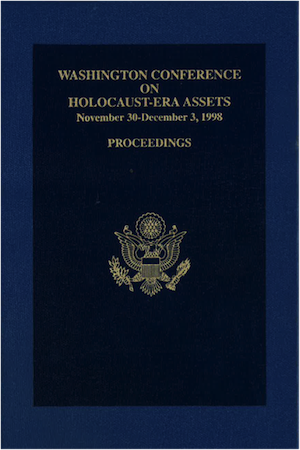The mission of the Commission for Art Recovery is to spur efforts to restitute art that was seized, confiscated, or wrongfully taken — on a massive scale — as a result of the policies of the Third Reich and the devastation of the Holocaust. Restitution includes not just the physical return of a work of art but also the process that enables such a return, including research, identification and a legal environment where claimants are encouraged to come forward and where claims may successfully be pursued without procedural obstacles. Restitution of history is also part of the process: the documentation and remembrance not only of the physical lives lost due to Nazi persecution during the Holocaust but also of the culture that disappeared along with the victims. Therefore, restitution is also commemoration. Last but most importantly for the generations to come, restitution work is also important to provide systematic information from which we can learn the methods of mass-cultural annihilation during genocide, and hopefully we can use that knowledge for preventing or at least minimizing mass-scale cultural destruction in the future.
To carry out restitution work in its full sense, the Commission established five distinct initiatives.
- The Historical Research Initiative attempts to persuade governments and museums to research, identify and publicize works in their possession that were stolen during the Nazi era (1933-1945), and locates missing art on behalf of Holocaust victims.
"Heritage Revealed" was a joint project undertaken by the U.S. and Russian governments with the assistance of CAR and the World Jewish Congress. Its aim was to fund and direct efforts to research and uncover cultural assets brought to the Former Soviet Union as trophy art in the aftermath of World War II. The project explored research materials available in Russia relating to trophy art, and published three catalogs documenting cultural valuables whose location had been kept secret for decades. More recently, CAR is cooperating with the Claims Conference and the United States Holocaust Memorial Museum to enlarge the ERR-Jeu de Paume database, which for the first time brings together searchable digitized copies of the remaining registration cards and photographs of more than 20,000 art objects taken from Jews in German-occupied France, to include further information from Belgium, the Netherlands and Germany.
Jewish Digital Cultural Recovery Project Home Page - The Knowledge Exchange Initiative is a professional training and knowledge exchange program focusing on documentary materials held by various European archival and governmental institutions.
To date, no comprehensive research has been conducted regarding this topic and its cultural, historical and sociological context. There are many European heritage and government institutions holding records with relevance to Jewish collectors, collections and Jewish artists, but the flow of information between them has been fragmented and unsatisfactory. A significant amount of expertise has been accumulated in isolated scholarly communities. The project aims to address this problem and to bring together archive professionals from European institutions holding significant stocks. Current Partner Institutions - The Legislative Initiative advocates for policies that support claims and remove impediments to the return of stolen art.
The Commission for Art Recovery contributes significantly to further art restitution by maintaining positive momentum and awareness, as well as engaging into a solution-oriented dialogue process with respective governments and museums. CAR works closely with lawyers, scholars, art experts and other appropriate organizations safeguarding the legal rights of Holocaust survivors and their heirs. Our most recent efforts include supporting the Holocaust Expropriated Art Recovery (HEAR) Act of 2016 which was signed into law by former President Barack Obama on December 16, 2016, enables Holocaust survivors and their families to fully and fairly seek claims through the courts for property stolen from them during the Holocaust. In addition, CAR successfully advocated in favor of an export exception for art identified as being Nazi-looted in the context of the recently passed "Act on the Protection of Cultural Property" (Gesetz zur Neuregelung des Kulturgutschutzrechts) in Germany. - The Judicial Initiative uses litigation to encourage the adoption of international practices and principles that redress the injustice of looted art through restitution.
CAR is not a claims organization, but we support judicial initiatives brought forward by claimants when such litigation furthers the establishment and implementation of policies promoting art restitution. In this capacity, CAR supported the return of Gustav Klimt's "Portrait of Adele Bloch-Bauer", a landmark case which opened U.S. courts to claims by Holocaust victims and their heirs; CAR has also written amicus briefs in other U.S. cases, and recently mediated a U.S. claim resulting in a settlement. CAR is also supporting litigation brought by the heirs of the Herzog family against the Hungarian government with the aim of securing the return of over 40 pieces currently held by museums in Hungary. - The Educational Initiative assists professionals with provenance research and offers accessible programs that raise public awareness about looted art and restitution.
CAR organizes workshops and participates in seminars that provide professional development for lawyers, art historians, curators and law enforcement officers, including the Provenance Research Training Program, a project of the European Shoah Legacy Institute (ESLI) (both the program and the Institute are now closed). An event held at the Harvard Law School in 2008 focused on looted art that was transported to the Soviet Union by the Red Army. Another event, organized in 2011 together with Christie's Auction House in Milan, examined issues of fascist and Nazi art looting in Italy. In 2014, CAR organized with Hashava and the Claims Conference a provenance training seminar in Israel. CAR also supports the creation and dissemination of educational materials relevant to the looting of artworks during World War II, and has supported the publication of scholarly articles and books, and a documentary.

